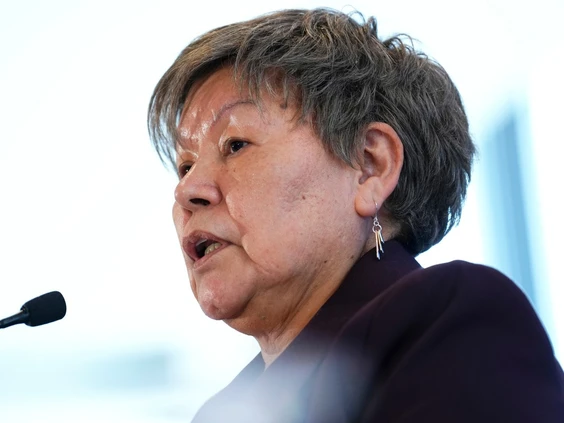
Eva Clayton, president, Nisga'a Nation PHOTO BY SEAN KILPATRICK /The Canadian Press
A British Columbia First Nation, in partnership with a Houston-based company, has announced the acquisition of a pipeline project primed for construction. The pipeline is intended to supply a proposed floating LNG export terminal located north of Prince Rupert.
The Nisga’a Nation, situated on the northwest coast of British Columbia near Terrace, along with its partner Western LNG from Texas, revealed their agreement to purchase the Prince Rupert Gas Transmission project from TC Energy Corp., a Calgary-based company.
While the financial specifics of the transaction were not disclosed, TC Energy stated in a news release that the initial proceeds from the deal would not have a significant impact. However, the company mentioned the possibility of receiving additional payments contingent upon the successful construction and operation of the pipeline.
Eva Clayton, President of the Nisga’a Lisims government, described the day as historic for the Nisga’a Nation, marking a significant shift in Indigenous participation in the Canadian economy. By acquiring an equal ownership stake in the pipeline, Clayton emphasized the nation's commitment to engaging in major industrial development projects.
The Prince Rupert Gas Transmission project spans 900 kilometers and has received permits for construction. It is designed to run from Hudson’s Hope to Lelu Island, situated near Prince Rupert. This pipeline was initially intended to supply the Pacific NorthWest liquefied natural gas (LNG) facility, a multi-billion-dollar project led by Malaysian energy giant Petronas. However, the project was abandoned in 2017 due to plummeting LNG prices and other factors.
Following the cancellation of the Pacific NorthWest project, the Nisga’a Nation and Western LNG proposed their own venture, the Ksi Lisims LNG project. This initiative involves the establishment of a floating LNG production facility capable of producing 12 million tonnes of LNG annually off the northwest coast of British Columbia.
While a final investment decision on the terminal is pending, consultations are underway, and regulatory approval has yet to be obtained. However, the acquisition of the Prince Rupert pipeline project provides Ksi Lisims with a significant piece of infrastructure necessary for its LNG project.
Davis Thames, CEO of Western LNG, expressed appreciation for TC Energy's efforts in developing the pipeline project. He highlighted the project's advanced stage, with full engineering, permits, and readiness for construction. Thames affirmed the partners' commitment to advancing the project with renewed momentum and a fresh perspective.
Canada's LNG industry has faced challenges in comparison to the United States, which boasts seven operational LNG terminals, making it the largest LNG exporter globally. However, the nearing completion of the Shell-led LNG Canada facility near Kitimat offers Canada an opportunity to export domestically produced natural gas as LNG.
Despite the potential benefits of LNG in reducing global greenhouse gas emissions by replacing coal, environmental concerns persist. Critics argue that LNG production and transportation processes generate emissions, while drilling and flaring of natural gas contribute to environmental degradation.
In response to environmental challenges, the Gitanyow Hereditary Chiefs of British Columbia have challenged the Ksi Lisims LNG project to substantiate its promises of greenhouse gas reduction. They have urged the British Columbia Environmental Assessment Office to pause the project's review.
The Nisga’a Nation and Western LNG intend to finalize an agreement with a construction manager for pipeline construction. They anticipate engaging with companies experienced in pipeline projects in British Columbia, including Coastal GasLink and the Trans Mountain pipeline expansion.















